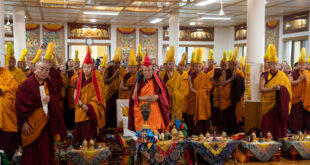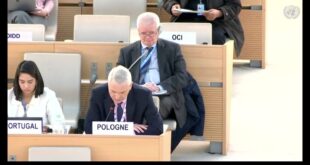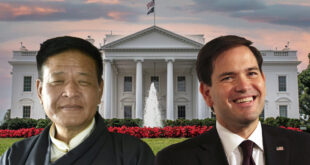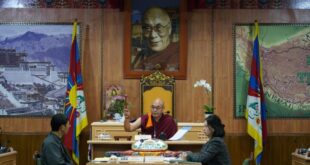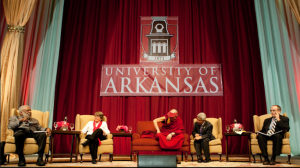
On May 11, 2011 His Holiness the Dalai Lama began his program in Fayetteville in the state of Arkansas, by visiting the Mullins Library of the University of Arkansas where there was an exhibition of Tibetan artifacts, scroll paintings, photos (taken by photographer Sonam Zoksang) and a mandala of Avalokitesvara (bodhisattva of compassion), constructed by Tibetan monks from Drepung Loseling, were exhibited.
Thereafter, His Holiness left for the Bud Walton Arena, to participate in a panel discussion Turning Swords into Ploughshares: The Many Paths of Non-Violence. His two co-panelists were Sister Helen Prejean, the nun and death-row activist whose opposition to the death penalty has won her an international audience, including through her book, Dead Man Walking; and Vincent Harding, whose long career in the African-American freedom movement began with Martin Luther King, Jr. On his arrival at the venue, His Holiness was received by University Chancellor Dave Gearhart. Around 10,000 people had gathered to listen to this session.
Chancellor Gearhart gave his welcome remarks and appreciated the university’s student-funded Distinguished Lecture Series for sponsoring the event.
Thereafter, Sidney Burris, director, Fulbright College Honors Program of the University, who was moderated the session, gave his introductory remarks. He said that from the discussion among “a monk, a nun and a college professor,” the audience might learn something about incorporating non-violence in their daily life. He then invited the panelists to make their initial remarks.
His Holiness began by outlining the fact that man is a social animal and that our individual survival depend on the rest of the community. He said, unless it is a turtle (which is abandoned as an egg by its mother soon after being laid) almost all other living beings are cared for by their mother from birth.
His Holiness termed the basic human nature as being one of gentleness. He said although aggression was also a part of our nature, it came about as a result of our intelligence and greed. He said medical scientists have confirmed that constant anger and fear are bad for our health, which, he said, confirms that our basic nature is one of gentleness.
His Holiness said that non-violence is basically related to action. Those of our action that are motived by compassion are non-violence while those coming out of hate are violence.
Thereafter, Sister Helen Pejean and Prof. Vincent Harding shared their thoughts on the issue of nonviolence based on their individual experiences. Sister Pejean talked of her interaction with a prisoner on death row that made her realize that the people at large were ignorant of the reality surrounding death penalty. She said it led her to ask the question, “Where does the imitation of violence take us?” and she has since become a leading campaigner for the abolition of death penalty.
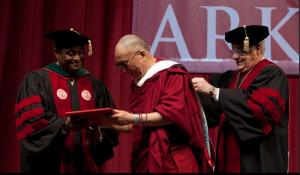
Prof. Harding spoke about his family upbringing by a single mother and the environment around him that led him to begin wrestling with the issue of non-violence. He talked about his participation on movements for compassionate justice and nonviolent social change, including how he became a conscientious objector in the US Army. He eventually started working with Dr. Martin Luther King Jr.
Both the panelists talked about the strong impact of their Christian religion in their approach towards the issue of non-violence.
His Holiness remarked that the testimony of the two co-panelists confirms the fact that all major religious traditions have the same potential to promote inner peace.
Highlighting the importance of forgiveness, His Holiness suggested that this does not mean bowing down to the other. Rather, people need to make a distinction between the actor and the action when dealing with the issue of tolerance. Citing the case of the Tibetan people, His Holiness said that while we oppose and criticize China’s action regarding Tibet, we nevertheless respect the Chinese people and have compassion for the Chinese Communist hardliners.
His Holiness mentioned that the very nature of violence is one of unpredictability and therefore it cannot be lasting solution to any problem. Citing the over 200 million death due to violence in the 20th century His Holiness said that this 21st century should be one of dialogue.
The panelists all highlighted the significance of dialogue with the adversary to resolve issues. His Holiness recalled meetings that he participated with victims from both sides of the Northern Ireland conflict. He said initially there was a tense atmosphere but after some meetings he found during a subsequent visit that the people had become much relaxed.
His Holiness also talked about his opposition to death sentence saying that it punishes the person and not the action. He said the real effective way would be to deal with the action. His Holiness said right from an early age, around 1945-46, when he learnt about the death sentence from the Nuremberg Trials, he had been much saddened. He said that he was also a signatory to the campaign for abolition of the death sentence launched by Amnesty International.
Following lunch, His Holiness briefly addressed a luncheon during which lauded the American democratic values. Citing the cases of impeachment trial of President Clinton (His Holiness called him “another close friend”) as well as the trial of the former Indian Prime Minister, Narasimha Rao, His Holiness said that these indicated that only in a democratic society was there no difference between a president and a beggar. His Holiness referred to the budget crisis and the near shut down of the Federal government in the United States and the risk of unemployment to several officials and said that Americans should not be deterred by these economic challenges. His Holiness also thanked the University for its decision to have a Tibetan girl student this year.
His Holiness then went back to the Bud Walton Arena, for the public talk on “Non-Violence in the New Century: The Way Forward.” Prior to the talk the University conferred an honorary degree on His Holiness.
Chancellor Gearhart in his welcome remarks said that the University was “humbled to partner with the Dalai Lama in spreading his message of non-violence.” He recognized the contribution of Sidney Burris and Geshe Thupten Dorjee, who teach at the University for working on the visit of His Holiness as well as for the TEXT Project, or “Tibetans in Exile Today,” an oral-history program designed to record the stories of Tibetans currently living in refugee settlements in India. The project focuses on the Tibetans who left their country in 1959, but still have vivid memories of traditional Tibetan culture. He also announced the University’s partnership with the Tibet Fund to have a Tibetan student at the University.
Chancellor Gearhart invited University of Arkansas board of trustees chairman Carl Johnson and University of Arkansas System President Alan Sugg to join him the presentation. Chancellor Gearhart remarked, “Honorary degrees are conferred on individuals who have achieved extraordinary distinctions in the sciences or the arts or public affairs. Recipients of the degrees are exceptional individuals who have demonstrated their appreciation of and dedication to the ideals and purposes of the University. It is my distinct pleasure and great honor to present H.H. the Dalai Lama for his promotion of basic human values, secular ethics in the interest of humanity, for fostering inter-religious harmony and welfare of the Tibetan people.”
Dr. Johnson then announced the honorary degree. The Citation read.
“University of Arkansas. To all to whom these presents may come. Greeting. Be it known that in recognition of his exalted character, his eminent attainments in arts and letters, his devotion to truth, duty and the welfare of society, the Board of Trustees of the University of Arkansas have this day conferred upon Tenzin Gyatso, His Holiness the Fourteenth Dalai Lama the degree of Doctor of Humane Letters with all the rights and privileges pertaining thereto. Fayetteville, Arkansas, May 14, 2011.”
His Holiness then began his talk by saying that he regarded the degree as an appreciation of his contribution to the society. He said as he was nearing the age of 76, he would continue to dedicate the rest of his life for the causes for which the degree was awarded. He joked that it was his hope that the award will not be wasted.
His Holiness said he came from the Roof of the World or the Land of the Snows. He said there are those who call him a God King or a Living Buddha and that these were nonsense. He said it was also nonsense for those who were calling him a demon. He said he was just a simple Buddhist monk and he remembered this even in his dreams.
He said while talking here he was not thinking of himself as a Buddhist monk but as a human being. We are all human beings and everyone wants happiness, he said. He then said mere sensorial satisfaction did not define happiness and that there was the need for a deeper mental level satisfaction. For this there was the need to cultivate inner values, he said. His Holiness then said the real sense of inner value is human warm heartedness.
He said those individuals who received warm heartedness and affection when they were young developed a more positive outlook than those who did not receive them. He referred to the kindness he received from his mother from a very young age, which even made him a bit “bossy.” He talked of pulling his mother’s ears while riding on her shoulder to lead her to the direction he wanted to go. He also recalled a Jewish teacher whose lesson about looking at the adversary in the image of God had a positive impact on his Palestinian students in their outlook towards the soldiers at the Israeli check posts.
His Holiness said thus it was common experience that people who have received affection are much happier adding that constant fear, anger and hatred are eating our immune system.
He said the 20th century had seen extraordinary innovation but at the same time it had witnessed much violence. Highlighting non-violence, he said that people needed to understand the importance we are all interdependent. Destruction of neighbor is a destruction of the self.
He said it was through action that we could bring about peace in the world.
His Holiness said peace did not mean that there would be no problems in the world. He joked that all problems in the world would disappear only if the human species disappeared or when there was a change in the human brain.
His Holiness concluded by calling for the promotion of a culture of dialogue and said that there was the need for educational institutions to promote the awareness of warm-heartedness.
His Holiness then answered several questions collected via the Internet. When asked what did he value most from all his travels, he responded that he valued his freedom and his informal nature. Asked about his view on the Arab Spring, he said that these were the sign of desperation. He said the world belonged to humanity and not to governments, kings or spiritual leaders. Egypt, he said, belonged to the Egyptian people and not to any particular leader.
To a question whether he had learnt to drive a car, His Holiness responded in the positive saying that there were three cars in Lhasa from the time of the 13th Dalai Lama and he had asked for these to be repaired (as they had been lying unused for a long time) by drivers who were brought from India. Once, at the age of 17 or 18, when the driver was not there he drove a car within his residential compound but had an accident when he closed his eyes to avoid a tree branch. Asked about the feeling of Tibetans in Tibet in not being able to see him there, His Holiness said that the ordinary Tibetans very much wanted him to return but that the intellectuals appreciate the fact that he was living in a free world. He said although a new generation of Tibetans had come up in Tibet the Tibetan spirit was very much strong.
In response to a question on the impact of three rivers of Tibet to downstream regions like Burma, etc, His Holiness talked about the importance of the Tibetan plateau on the environment and how many people are affected by any changes there.
His Holiness also responded to another question about his devolution of political authority saying that he felt very proud to end a four hundred century old tradition of political rule by the Dalai Lamas. He said he found it a bit hypocritical for him to hold on to his dual position while telling others that religious institutions and political institutions should be separate. His Holiness said he had said in the past that the Chinese Communist Party could take a lesson from the 150,000 Tibetans in exile in terms of transformation of authority. The People’s Republic of China deserved to be a super power but that can come about only through gaining respect and trust from the international community, he said, adding that military force only brings about fear. He said the 1.3 billion people in China have the right to know reality and to judge for themselves without censorship or distorted information. He, however, said the change in China should be gradual as an overnight change would be chaotic.
To a question on how peace can be cultivated when there are lot of problems, His Holiness suggested that one should develop inner strength. Giving his own example he said that with such a development the problems would be momentary while there was inner calm. He likened this to the situation of an ocean where on the surface there was active movement on account of the waves but beneath that the water was calm.
His Holiness then concluded by saying that if people found anything useful from his talk today they should think over them and try to implement them. The over 12,000 people in the audience gave him a standing ovation.
In conjunction with the visit of His Holiness the Dalai Lama several Tibet-related activities were being held in Fayetteville. The Mayor of Fayetteville Lioneld Jordan, who received His Holiness on his arrival yesterday, remarked to the press that “The city of Fayetteville is a very welcoming and diverse place where we serve all people. The beliefs of the Dalai Lama go hand in hand with what this city stands for.”
Mayor Jordan had declared this week as Tibet Week and May 11 as Dalai Lama Day.
The University of Arkansas in Fayetteville was the sixth University that His Holiness had visited during this current trip. His Holiness arrives in Newark in the state of New Jersey for the last leg of his programs in the United State.

